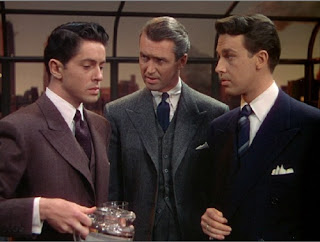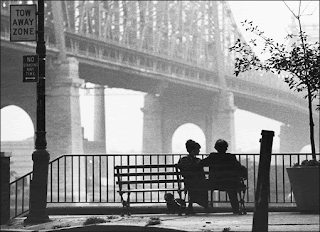The central thing with Rope is whether or not Hitchcock's decision to present it as one long take comes off. My feeling is that Hitch struggles in the early stages to generate the tension that fills the film's better, later moments. In these early moments we see (homosexual?) roommates Brandon and Phillip murder their close friend David. The reason for the murder, it is explained, is that Brandon (John Dall) and Phillip (Farley Granger) believe killing to be an artform. Part of the crime, then, is also the presentation and so to add paniche to their evil deed, the two men stage a party and invite the dead man's parents, lover and former teacher (James Stewart). Now, the danger with long, masterful takes is that it can feel like the actors are merely reading their lines and, in the immediate aftermath of the murder, Rope buckles under the weight of having to give an enormous amount of exposition with very little on-screen action. It feels like a play.
But as the party gets going, so does the movie. The arrival James Stewart signals an improvement in fortunes, as the inquisitive, suspicious and highly intelligent teacher suspects that something is amiss. It's here that the single-shot technique comes into its own, allowing Hitch to rest upon Stewart's marvelous performance. The stand out moment is surely when, after being angered by a chicken throttling anecdote, Phillip briefly loses his cool and the camera rests on the teacher's face; we can practically see the cogs whirring.
Long takes aside, the movie's premise encourages perhaps one of the greatest displays of dramatic irony - all secondary school english students should take notes - that you'll ever see. And its use of the one location really adds to the claustrophobic, insulated nature of the two men's relationship. So although Rope does feel like an experiment, its strong hypothesis that the 8 minute takes would generate intensity ensures that it still deserves to be seen.










